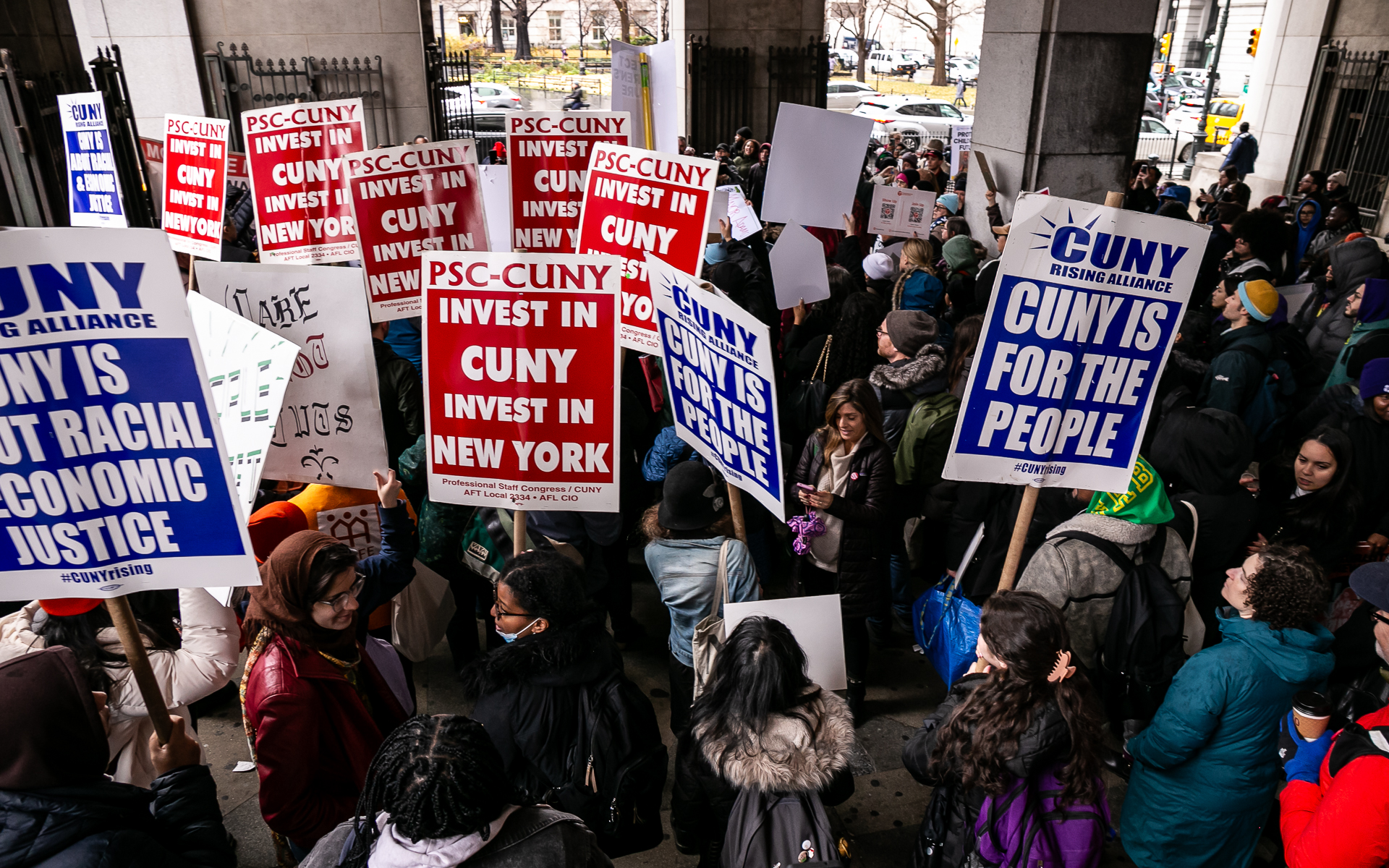“Last year, the federal government earmarked billions of dollars for community-led climate solutions…CUNY can deliver because of its symbiotic relationship to communities, neighborhoods, and families who live, work, and organize on the frontlines.”

Adi Talwar
A 2023 rally calling for greater investment in CUNY.Every September, global climate leaders descend on New York City for the simultaneous occurrence of Summit of the Future and Climate Week NYC. Panels are stacked with a range of international delegates, but typically there are few, if any, seats reserved for community organizers already modeling climate justice on the ground in New York City.
Because low income communities of color are disproportionately impacted by climate change, climate justice demands that climate solutions redress racial and economic inequality. When local experts and community-based organizations (CBOs) are invited to the decision-making table, climate justice can be served.
With 25 campuses across all five boroughs, the City University of New York (CUNY) is a world-class system well-situated to catalyze hyperlocal research and support community-defined climate solutions at scale. For example, the NYC Climate Justice Hub is an extensive partnership between CUNY and New York City Environmental Justice Alliance (NYC-EJA), a coalition of grassroots organizations leading the fight for environmental and climate justice since 1991.
By leveraging the university as a civic asset in the fight against climate change, and resourcing community-university partnerships like the NYC Climate Justice Hub, New York City and State can achieve the ambitious climate goals they struggle to meet. But we need critical city, state, and federal funds to make CUNY “the climate justice university.”
CUNY is a minority-majority institution with 225,000 students, 40,000 employees, and ties to CBOs like NYC-EJA all across the city. In 2022, 23 percent of adults and 25 percent of children in New York City lived in poverty. By comparison, 60 percent of CUNY students report an annual household income of less than $30,000. Many students live, work, and learn in environmental justice areas regularly flooded by rainfall and choked by polluted air. With a mandate to serve “the children of the whole people,” CUNY increasingly works with local experts and CBOs to design curriculum and conduct research that secures greater environmental security and economic well-being for everyday New Yorkers.
Across the CUNY consortium, there is a concerted effort to build a climate justice bridge that links research, degree programs, and professional pathways. The CUNY Offshore Wind Advisory Network advances energy democracy at community colleges. Baruch College’s Climate Scholars Fellowship and John Jay College’s Sustainability and Environmental Justice program prepares students to shape climate law and regenerative economies. A new doctoral certificate program at the CUNY Graduate Center caters to emerging scientists and social scientists who seek research skills explicitly to serve their communities’ environmental justice needs.
Other initiatives like FloodNet and The Community Sensor Lab bring science, social justice, and local expertise together to implement community-based solutions to large climate challenges. Such efforts have the potential to positively transform the lives of New Yorkers across every economic stratum if CUNY is properly resourced to grow them to scale. Currently, those resources are sorely lacking.
While New York City increased its support for CUNY in Fiscal Year (FY) 2025, city and state funding still fall short of covering the estimated $3.5 billion CUNY will need to maintain and decarbonize 300 buildings across 25 campuses as climate breakdown intensifies. Additionally, the university needs reliable, long-term funding to hire, support and retain the faculty and students whose scholarship is the foundation for working with communities to create just solutions for climate change and environmental challenges.
New York City will be the first in the U.S. to implement climate budgeting, a visionary decision-making process that privileges science-based climate considerations when allocating funds. But to date, this decision-making matrix misses the point that an investment in CUNY—the largest public urban university in the U.S.—is an investment in achieving just and sustainable futures.
Last year, the federal government earmarked billions of dollars for community-led climate solutions through its Justice40 Initiative—currently caught up in city and state bureaucracies. There is a real risk that bad faith actors and powerful private institutions with massive endowments will take advantage of this windfall in the name of public good, without the will or capacity to deliver on it. CUNY can deliver because of its symbiotic relationship to communities, neighborhoods, and families who live, work, and organize on the frontlines.
Elizabeth Yeampierre, head of the Sunset Park, Brooklyn-based environmental justice organization UPROSE, has coined the phrase, “climate justice lives here.” By removing social, racial, and economic barriers to climate education, decision-making, and careers, we believe that climate justice lives at CUNY, too. But to fulfill its potential as “the climate justice university,” CUNY needs city, state, and federal buy-in.
Kendra Sullivan is the co-director of the NYC Climate Justice Hub and the director of the Center for the Humanities at the CUNY Graduate Center. Kieren Howard is a geologist and the executive officer of the earth & environmental sciences doctoral program at the CUNY Graduate Center.








